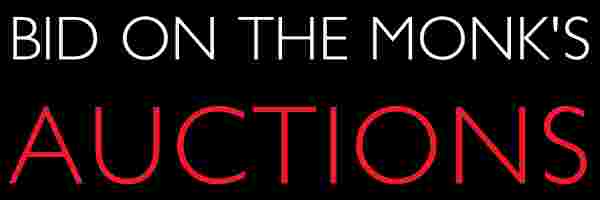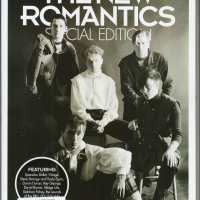 I just attended Moogfest, which is a festival ostensibly inspired by Bob Moog’s work in developing the synthesizer. I’ve been listening lately to the new John Foxx + The Maths album, “Evidence” recently and it got me thinking about Kraftwerk. The elephant in the room when discussing synthesizers. It goes without saying that from 1974 to at least 1981, the group were unimpeachable in their pursuit of the acme of machine music. After that, it all seemed to unravel rather quickly. The questions arise. Why? How? I can hazard a few guesses.
I just attended Moogfest, which is a festival ostensibly inspired by Bob Moog’s work in developing the synthesizer. I’ve been listening lately to the new John Foxx + The Maths album, “Evidence” recently and it got me thinking about Kraftwerk. The elephant in the room when discussing synthesizers. It goes without saying that from 1974 to at least 1981, the group were unimpeachable in their pursuit of the acme of machine music. After that, it all seemed to unravel rather quickly. The questions arise. Why? How? I can hazard a few guesses.
With “Autobahn” the band managed to have a worldwide hit with an electronic pop soundscape [at a time when no such things existed, apart from historical novelties like Gershon Kingsley’s “Hot Butter” or Apollo 100’s “Joy”], and in German to boot! To say that the “Autobahn” album and its four descendants had a galvanizing effect on the pop music that followed is no hyperbole. All of my favorite core collection acts looked to Kraftwerk for inspiration. Without them, I have no idea what kind of music I would have grown up and prospered on. I had always liked music, even the US early 70s Top 40 dross I grew up with as a child, but until I heard their work and its stylistic brethren, I was not hearing music that spoke intimately to me.
Why is there a line in the sand following 1981’s “Computerworld” that strongly differentiates what followed later in their career as music that is lacking somehow and to many, disappointing to their legacy? For a start, I can point to the development of sampling keyboards as an inflection point of catastrophic proportions. Word has it that when Kraftwerk heard the “Into Battle” EP by The Art Of Noise, they were rattled. Seriously rattled. And this was a group that did not rattle easily! They were so rattled, that their long-gestating “Technopop” album was scrapped with only a single, “Tour De France” eventually appearing in 1983.
That single did have a fine melody and was the first evidence of leader Ralf Hutter’s cycling obsession, but the track was jarring in that it marked their first use of samplers. The bass guitar samples it featured were somewhat wrong for placement within their vision. Prior to this, Kraftwerk, who began using stock Moogs available in the early 70s, had been developing their gear with a private army of technicians. A glance at the inner sleeve of “Computerworld” has many credits for technical assistance in the album’s development. The physical limitations of analog sound synthesis insured that any non-stock, customized/modified hardware couldn’t help but generate sounds of novelty.
And when a band describes themselves as “sound technicians” then no less than the creation of sound itself is their goal. With analog synths, this is all but assured since absolutely replicating sounds is not possible to 100% accuracy. Added to that, the circuits would self-modify with responses to environment or ambient temperature. That is to say, they would de-tune, over time and use. The move to digital was antithetical to that approach with clinical precision all but assured with each press of a button. The move to sampling, meant that Kraftwerk, were following instead of leading, because they [wrongly] saw digital and sampling synthesis as being where they should be.
What ultimately seemed to happen is that having that much precision of sound meant that the music had a greater capacity for clinical sterility, which, unfortunately, seemed to be appealing to Ralf Hütter. The part of his makeup that gravitated to this quality of digital synthesis, insures the was now in a situation where he could not see the forest for the trees. There is a world of difference between striving for perfection [and falling] and actually achieving it.
This is where I differ with Hütter. I see perfection as an unreachable goal that the grasping for only distracts from the basic business at hand of creating something. The pitfalls and “accidents” along the way add texture at the very least to art and can unwittingly transform it in radical and unforeseen ways. It seems like Hütter is put off by that attitude. How else to explain the ever expanding gulf of years/decades between Kraftwerk albums post-1981 as he seeks to have absolute control over his beloved sounds?
It was telling that the lackluster “Electric Cafe” appeared five years on from “Computerworld” but didn’t seem any better for all of the knitting of brows that apparently went into its creation. Then five years later, the next Kraftwerk album appeared, and it was merely an all-digital compilation of past glories now rendered more sterile, for the most part. Admittedly, the new version of “Radioactivity” was a cracker! It alone justified the entire, semi-dubious exercise. Then, a dozen years down the line and a new Kraftwerk album appeared. Tellingly, “Tour De France Soundtracks” again sought to re-work past material and this time there was no track like “Radioactivity” to salvage it. The resulting album is a characterless Kraftwerk pastiche that sounds more like one of the many faceless techno concerns that sprung up in their wake rather than the real thing.
Next: Alone again…naturally





![Rock GPA: Orchestral Manoeuvres In The Dark [part 77]](https://postpunkmonk.files.wordpress.com/2023/12/omd-2023-black-red-andy-paul.jpg?w=200&h=200&crop=1)

![Nits Enthrall For Their Golden Jubilee Concert At Royal Theatre Carré [part 3]](https://postpunkmonk.files.wordpress.com/2024/04/nits-poster.jpg?w=200&h=200&crop=1)
![Forty Years Ago Today, Simple Minds Changed Everything with "New Gold Dream [81,82,83,84]"](https://postpunkmonk.files.wordpress.com/2022/09/new-gold-dream-in-spotlights.jpg?w=200&h=200&crop=1)
It seems like sampling keyboards and the digital soundscape were crack for Hutter/Kraftwerk. I wholly agree that to use the technology to reach that previously perceived state of perfection was to actually loose the plot. Even Computerworld seemed less important a work – likely because it was release in a sea of work which was being released by those who had been inspired by Kraftwerks earlier work. I remember thinking that Computerworld felt like Kraftwerk reaching for the fan base that DEVO, especially after Duty Now For The Future, had cultivated. Kraftwerk already seemed to be reflecting rather than reaching forward with their sound.
I love Tour De France as a single. I wonder if they and released the other work which was made at the time if I would have been as pleased with it. That it morphed into Electric Cafe was disappointing in the end. As I look forward to the next installment, I will leave this post with the frustrating statement that I find Aero Dynamik from Tour De France Soundtracks to be utterly engaging!
LikeLike
Echorich – I don’t know about “Computerworld” sounding like DEVO. On one hand, I get what you’re saying. The seeds may be there, but they just took that sound so much further than DEVO. I mean, nothing sounded like “Numbers” to me! On the other hand, you are certainly right in that “Aero-Dynamik” is the standout tune on TDFS! Along with “Elektro Kardiogramm.” It’s just that even these two just paled compared to “Radioactivity 2” from “The Mix” for me. That single track, more than anything, justifies the last 25 years of Kraftwerk for me, if it can be said.
LikeLike
My DEVO reference was more about how Computerworld seemed to be Kraftwerk light. Hutter seemed to be reaching for the audience that others had begun to cultivate by using his blueprint. I think the computers and synths on DNFTF are highly underrated. Sure DEVO was still quite a lot about guitars, but the synths were seeping in all over that album and really intrigued me. I am a Kraftwerk fan of the Trans Europe Express/Man Machine Era. I took those albums VERY seriously as a kid and Computerworld just wasn’t up to snuff in comparison.
LikeLike
Interesting read again, Herr Monk. Kraftwerk were dear to my heart for a fair while, to the extent I even used to publish and old-fashioned paper and staples fanzine many moons, which is preserved in a small way with my site at http://www.aktivitaet-fanzine.com
Agreed for sure that getting to grips with digital technology is a major factor – you listen to ‘Electric Cafe’ (or ‘Technopop’ as Herr Hütter’s revisionist tendencies has now repositioned it in the ‘Katalog’ re-issues of recent years) and hear digital synth presets (not least of which the slap bass on ‘Sex Object’) from a band that hitherto had skilled technicians on call to scratch-build kit (such as the Matten and Weichers sequencer and so on) and think – whaaaaaat?! Kraftwerk were hardly alone in this though – the mid-80s becomes something of a burial ground for other acts I had liked a lot who had made their most interesting material when having to grapple with analogue synths and effects, having to bend the machinery to their will. With the onset of the Yamaha DX7 et al, far too many acts were too easily lured by the seductive presets which, at the time no doubt sounded the business but all too quickly were done to death – tubular bells, rhodes electric piano, basses et al. The machines were playing the men (and women).
Having said that, ‘Electric Cafe’ did have its moments – its just they went on too long. Most of the tracks long outstay their welcome. Getting busy with the editing scissors would have much improved matters. ‘Musique Non Stop’ was a mistake as a single though. Much too sparse – much better on ‘The Mix’ and live outings, where some bass foundation makes all the difference. The opening of ‘The Telephone Call’ is fantastic, but as a whole the track drags on too long – same issue with ‘Technopop’ in particular. Interestingly though, a radically different early demo of ‘Technopop’ exists, surfacing on bootlegs, which is a rougher altogether different draft which, as it fades out prematurely, has the arpeggiated sequencer reminiscent of earlier work such as ‘Europe Endless’ present – which is completely missing from its eventual outing.
‘Art of Noise’ is a good call – truly ground-breaking stuff. In retrospect you can probably see the difference – AoN were a team effort, playing around with the technologies, having fun – one imagines that Camp Kraftwerk by the same time is a somewhat more strained environment, aware of the potential for being overtaken by others – and the increasing control from Herr Hütter which in time is evidenced as long-standing members leave one by one. By the time of Florian’s departure, its no bad thing – you listen to late period live renditions and he’s virtually vandalising tracks with his extreme pitch bends and filtering and so on, perhaps out of sheer on-stage boredom. It’s not bringing anything good to the party, that’s for sure.
‘Into Battle’ was never a full-length album though – and even AoN struggled to make a cohesive album as a whole. I don’t think anyone would argue that ‘Who’s Afraid…’ was solid gold start to finish. Had ‘Electric Cafe’ been an EP of shorter duration, maybe we’d think more kindly of it?
By ‘The Mix’ though, bloat is still evident – those noisy, bleepy detours shoe-horned into most of its tracks – and the shamelessly ‘with it’ house sounds of the time which carbon date it badly now. Its interesting to hear some of those same sounds of the ‘Mix’ era renditions of ‘Home Computer’, for example, resurface on ‘Tour de France Soundtracks’ – twelve years on!
LikeLike